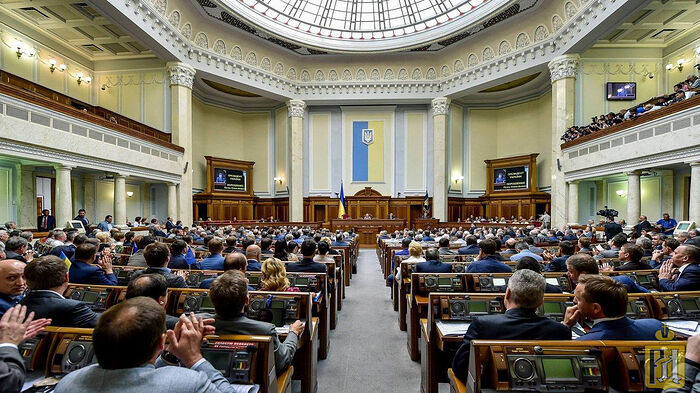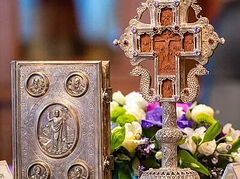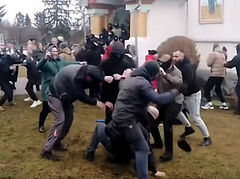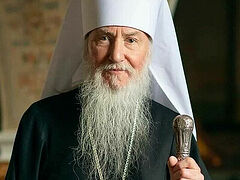Although this article is from the beginning of April and there have been a number of updates, and the bill has for all intents and purposes been accepted, the author’s explanation of the essence of the matter continues to be relevant.—OC.
The Verkhovna Rada [Ukrainian Parliament] is currently considering bill 8371, which proposes banning the Ukrainian Orthodox Church (UOC). However, the Ukrainian Parliament seems to be dragging its feet on adopting this controversial initiative. This story involves American Republicans and Ukrainian industrialists. Will the Church be banned in Ukraine? Read about it in our article.
History of the Issue
In October 2023, the Verkhovna Rada supported bill 8371 with 267 votes, which Ukrainian believers call the “law on banning the UOC.” After this, it was supposed to be brought to a vote for the second reading, but this has not yet happened.
Bill 8371 bans the activities of the Russian Orthodox Church or religious organizations associated with it in Ukraine. There is already a conclusion from a religious studies examination stating that the UOC is such an organization. Previously, the bill only allowed courts to issue rulings banning such religious organizations.
After the first vote, the UOC turned to American lawyer Robert Amsterdam, head of the international human rights firm “Amsterdam & Partners LLP,” to protect the Church’s interests. The human rights lawyer gave an interview to TV host Tucker Carlson, in which he spoke about the persecution of the UOC. The interview garnered 50 million views.
In one of his statements, Amsterdam threatened the deputies with US sanctions if bill 8371 is passed. He also mentioned that the ban on the UOC would negatively impact US support for Ukraine.
Anglican Bishop Nick Baines from the UK appealed to the Ukrainian ambassador in London to withdraw the bill. In his opinion, the provisions of the bill are discriminatory and violate international norms.
Additionally, there are dissenters among the Rada deputies regarding bill 8371. In November 2023, fifty-one deputies appealed to Speaker Ruslan Stefanchuk, requesting that the bill be sent to the Venice Commission.
As a result, despite Ukrainian President Volodymyr Zelensky’s call to pass bill 8371 as quickly as possible, it has yet to be brought to a vote. The deputy head of the parliamentary committee on humanitarian policy, Yevhenia Kravchuk, had previously promised that the document would reach the floor by February. However, it was only finalized in March.
Foreign Influence
The problem with passing bill 8371 is that the issue of persecution of the UOC is being actively used in the election campaign by American Republicans. In 2022, the son of former president and election candidate Donald Trump stated that Zelensky is banning Orthodoxy in Ukraine.
“Zelensky is going to ban the activities of the UOC. His government is also conducting raids in UOC churches and detaining priests. Maybe that’s why he’s become a superstar among Democrats?” he wrote on the social network X (formerly Twitter).
In addition, TV host Tucker Carlson has repeatedly spoken about the persecution of the Church and the involvement of current Democratic President Joe Biden. In one broadcast, he said:
“The US government, under several presidents, has effectively funded the killing of Christians in Syria, and this continues throughout the Middle East and Eastern Europe, in Ukraine. The most obvious example: The Ukrainian government has now banned an entire Christian denomination,1 and almost no one in the US has said anything about it.”
Some Ukrainian publications link the support for the UOC in Washington to the activities of major Ukrainian businessman Vadym Novinsky. Novinsky is part of the financial and industrial group of Ukraine’s wealthiest man, Rinat Akhmetov, who has his own contacts in the US. Securing support from Republicans, who need reasons to criticize Democrats, is quite feasible.
Under such circumstances, it is plausible that the White House asked the Kyiv authorities to slow down the passage of the bill to avoid providing grounds for criticism. However, the problems for the UOC have not ended.
Ongoing Persecution of the Church
Alongside the saga surrounding bill 8371, there are ongoing arrests of clergy and seizures of UOC churches in Ukraine. The main instigators in this process are the Security Service of Ukraine (SBU), schismatics from the “Orthodox Church of Ukraine,” and nationalists.
In mid-March, journalists from the publication “Union of Orthodox Journalists” and representatives of the human rights initiative “Center for Legal Protection” were detained. On March 14, one of them, UOC Archpriest Sergey Chertilina, was sent to a pre-trial detention center for two months by the court. The SBU stated that the journalists and public activists were engaged in “information sabotage” and face life imprisonment.
In Zakarpattia, unknown individuals kidnapped the secretary of the Khust Diocese, Archpriest Ioann Rozman. He was first summoned to the police by a subpoena, but upon leaving, he was detained by masked, armed men who took him away in a minibus to an unknown location.
Additionally, UOC churches are being seized across Ukraine. For example, on March 13 alone, two churches in the village of Kotsiubynske in the Kiev region were seized: St. George’s Church and the Dormition Church.
The usual method for seizing a church involves a well-practiced scheme akin to a corporate raid. A “gathering of believers” is organized, where “activists” are brought in, and then they storm the church, with complete indifference from the police.
In some cases, churches have managed to fend off these seizures. For instance, on March 14 in Volhyn, parishioners of the Nativity of the Theotokos Church in Kamin-Kashyrskyi were able to defend their church. Schismatics and nationalists broke the gates and repeatedly stormed the church, but about 200 parishioners gathered to protect their parish and succeeded.
In Cherkasy, despite the prosecutor’s petition, the court did not detain Metropolitan Theodosy (Snihiryov) of Cherkasy and Kaniv. The demand the bishop be sent to pre-trial detention also came from the SBU [formerly the KGB of Ukraine].
The lack of legal mechanisms and the general uncertainty of the Ukrainian authorities regarding the church issue prevent judges from making repressive decisions. However, the pressure from the Ukrainian security services and the nationalist segment of Ukrainian society on the Church persists.
Will the Bill Be Passed?
We managed to speak with a former employee of the Kiev Metropolia of the UOC and an expert on religious relations. He believes that the US is indeed pressuring the Kiev authorities to not pass the bill. However, there are other factors as well.
Firstly, given the setbacks on the front, Zelensky desperately needs any kind of victory. The ban on the “pro-Russian” UOC could serve as such a symbolic victory.
Secondly, Kiev is currently highly dependent on London, which, according to this expert, is actively turning Ukraine into an “anti-Russia.” This process also involves religion—there is an attempt to “Catholicize” Ukrainians. Banning the UOC would allow the transfer of believers first to the schismatic OCU, and then to the Greek Catholic Church of Ukraine.
“What will come of this remains to be seen. But the likelihood that the bill will be passed has increased. Most likely, it will be done under the pretext of strengthening national security,” the expert believes.







